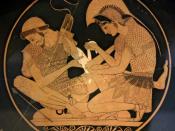A classical epic definition contains two distinctions; a literary style and a story. It is a narrative poem that is told in an elevated, formal, and grand style. It is not just a story, but a traditional history depicting events that effect entire civilizations centered on or around a monumental hero.
An epic was originally performed before an audience at a dinner or a special occasion; it would have been passed down in the oral tradition. Homer's work is an example of an epic that was passed down orally. The first epic in the literary style was written later by Virgil (Barker).
Epic works are marked by the use of several specific devices. They traditionally begin with an invocation of the muses and a brief introduction of the story. Virgil has multiple invocations but Homer only has invocations at the beginnings. Epithets are used in epics as descriptive tags. Homer and Virgil used epithets either as filler in a metric line of poetry or possibly as a mnemonic (Epithets).
Aeneas is often pious; Odysseus is known as wise or wily; Achilles is called swift-footed.
Another device used in epics are similes. They relate an object or event with a familiar image to give the comparison depth and clarity; they also intensify the emotional experience for the listener/reader. One of my favorite examples of a Homeric simile is in "The Iliad":
As when some mighty wave that thunders on the beach when the west/ wind has lashed it into fury- it has reared its head afar and now/ comes crashing down on the shore; it bows its arching crest high/ over the jagged rocks and spews its salt foam in all/ directions- even so did the serried phalanxes of the Danaans/ march steadfastly to battle. (Iliad, Book IV)
Such similes add...


